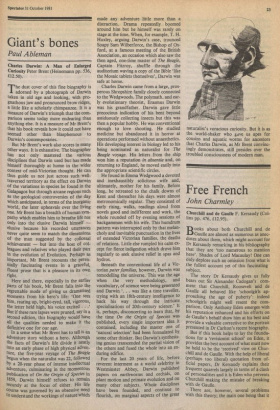Giant's bones
Paul Ableman
Charles Darwin: A Man of Enlarged Curiosity Peter Brent (Heinemann pp. 536, f12.50).
The dust cover of this fine biography is adorned by a photograph of Darwin taken in old age and looking, with prognathous jaw and pronounced brow ridges, a little like a scholarly chimpanzee. It is a measure of Darwin's triumph that the comparison seems today more endearing than anything else. It is a measure of Mr Brent's that his book reveals how it could not have seemed other than blasphemous to Darwin's contemporaries.
But Mr Brent's work also scores in many Other ways. It is exhaustive. The biographer has not only mastered the various disciplines that Darwin used but has made himself thoroughly at home in the wider context of mid-Victorian thought. He can thus guide us not just across such welltraversed territory as the effect on Darwin of the variations in species he found in the Galapagos but through arcane regions such as the geological controversies of the day Which anticipated, in terms of the inorganic world, the later upheavals over the living one. Mr Brent has a breadth of human sympathy which enables him to breathe life not only into the elusive Darwin himself — elusive because his recorded utterances never quite seem to match the dimensions of the man suggested by the collossal achievement — but into the host of colleagues and relatives who played their part in the evolution of Evolution. Perhaps as Important, Mr Brent recounts the perennially fascinating events in a graceful, fluent prose that is a pleasure in its own right.
Here and there, especially in the earlier Parts of his book, Mr Brent falls into the regrettable mode of giving us dramatised moments from his hero's life: 'One sees him, rearing up, bright-eyed, tall, vigorous, the letter held high, his voice excited . . But if these rare lapses were pruned, say in a second edition, this biography would have all the qualities needed to make it the definitive one for our age. In a sense what Mr Brent has to tell is an adventure story without a hero. Although the facts of Darwin's life divide it neatly Into an early phase of high physical adventure, the five-year voyage of The Beagle begun when the naturalist was 22, followed by a 20-year phase of intense intellectual adventure, culminating in the momentous Publication of On the Origin of Species in 1859, Darwin himself refuses to remain securely at the focus of either. His life course was governed by an obsessive need to understand the workings of nature which made any adventure little more than a distraction. Drama repeatedly boomed around him but he himself was rarely on stage at the time. When, for example, T. H. Huxley, arguing Darwin's case, trounced Soapy Sam Wilberforce, the Bishop of Oxford, at a famous meeting of the British Association, an occasion which also saw the then aged, one-time master of The Beagle, Captain Fitzroy, shuffle through the auditorium waving a copy of the Bible 'like the Mosaic tablets themselves', Darwin was safe at home.
Charles Darwin came from a large, prosperous Shropshire family closely connected to the Wedgwoods. The polymath, and early evolutionary theorist, Erasmus Darwin was his grandfather. Darwin gave little precocious indication of his bent beyond assiduously collecting insects but this was then a popular hobby. He was conventional enough to love shooting. He studied medicine but abandoned it in horror at operations performed without anaesthetics. His developing interest in biology led to his being nominated as naturalist for The Beagle voyage. His letters from the ship won him a reputation in absentia and, on returning to England, he moved easily into the appropriate scientific circles.
He found in Emma Wedgwood a devoted and inexhaustibly solicitous wife and, ultimately, mother for his family. Before long, he retreated to the chalk downs of Kent and thereafter his days were almost metronomically regular. They consisted of early rising, walks, readings aloud from novels good and indifferent and work, the whole rounded off by evening sessions of backgammon with his wife. This humdrum pattern was interrupted only by that melancholy and inevitable punctuation in the lives of extended Victorian families, the deaths of relations. Little else rumpled his calm except for fierce indigestion which drove him regularly to seek elusive relief in spas and hydros.
Beneath the conventional life of a Victorian pater familias, however, Darwin was remodelling the universe. This was the age when the very methodology, and vocabulary, of science were being generated and Darwin . . was like a time traveller, trying with an 18th-century intelligence to hack his way through the intricate specialisations of 20th-century science.' It is, perhaps, disconcerting to learn that, by the time On the Origin of Species was published, every single important idea it contained, including the master one of 'natural selection' had been formulated by some other thinker. But Darwin's synthesising genius transcended the partial vision of the others and fused the whole into an enduring edifice. For the last 20 years of life, before reverent interment as a world celebrity in Westminster Abbey, Darwin published papers on earthworms and orchids, on plant motion and primate evolution and on many other subjects. Whole disciplines have been founded, and continue to flourish, on marginal aspects of the great naturalist's voracious curiosity. But it is as the world-shaker who gave us apes for cousins and aquatic worms for ancestors that Charles Darwin, as Mr Brent convincingly demonstrates, still presides over the troubled consciousness of modern man.






































 Previous page
Previous page